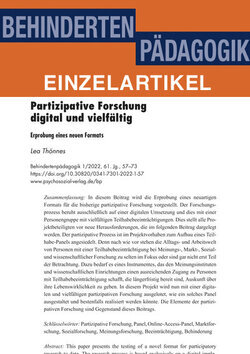17 Seiten, PDF-E-Book
Erschienen: März 2022
Bestell-Nr.: 23504
https://doi.org/10.30820/0341-7301-2022-1-57
abonnieren
Lea Thönnes
Partizipative Forschung digital und vielfältig (PDF)
Erprobung eines neuen Formats
Sofortdownload
Dies ist ein E-Book. Unsere E-Books sind mit einem personalisierten Wasserzeichen versehen,
jedoch frei von weiteren technischen Schutzmaßnahmen (»DRM«).
Erfahren Sie hier mehr zu den Datei-Formaten.
In diesem Beitrag wird die Erprobung eines neuartigen Formats für die bisherige partizipative Forschung vorgestellt. Der Forschungsprozess beruht ausschließlich auf einer digitalen Umsetzung und dies mit einer Personengruppe mit vielfältigen Teilhabebeeinträchtigungen. Dies stellt alle Projektbeteiligten vor neue Herausforderungen, die im folgenden Beitrag dargelegt werden. Der partizipative Prozess ist im Projektvorhaben zum Aufbau eines Teilhabe-Panels angesiedelt. Denn nach wie vor stehen die Alltagsund Arbeitswelt von Personen mit einer Teilhabebeeinträchtigung bei Meinungs-, Markt-, Sozialund wissenschaftlicher Forschung zu selten im Fokus oder sind gar nicht erst Teil der Betrachtung. Dazu bedarf es eines Instrumentes, das den Meinungsinstituten und wissenschaftlichen Einrichtungen einen ausreichenden Zugang zu Personen mit Teilhabebeeinträchtigung schafft, die längerfristig bereit sind, Auskunft über ihre Lebenswirklichkeit zu geben. In diesem Projekt wird nun mit einer digitalen und vielfältigen partizipativen Forschung ausgelotet, wie ein solches Panel ausgestaltet und bestenfalls realisiert werden könnte. Die Elemente der partizipativen Forschung sind Gegenstand dieses Beitrags.
Abstract:
This paper presents the testing of a novel format for participatory research to date. The research process is based exclusively on a digital implementation and this with a group of people, affected with diverse barriers in participation. This poses new challenges for all project participants, which are outlined in the following paper. The participatory process is located in the project plan for the establishment of a participation panel. Because still the everyday life and working world of persons, affected with diverse barriers in participation are too seldom in the focus of opinion, market, social and scientific research or are not even part of the consideration. For this purpose, a tool is needed that provides opinion institutes and scientific institutions with sufficient access to persons, affected with diverse barriers in participation who are willing to provide information about the reality of their lives in the long term. This project is now using digital and diverse participatory research to explore how such a panel could be designed and, at best, implemented. The elements of participatory research are the subject of this paper.
Abstract:
This paper presents the testing of a novel format for participatory research to date. The research process is based exclusively on a digital implementation and this with a group of people, affected with diverse barriers in participation. This poses new challenges for all project participants, which are outlined in the following paper. The participatory process is located in the project plan for the establishment of a participation panel. Because still the everyday life and working world of persons, affected with diverse barriers in participation are too seldom in the focus of opinion, market, social and scientific research or are not even part of the consideration. For this purpose, a tool is needed that provides opinion institutes and scientific institutions with sufficient access to persons, affected with diverse barriers in participation who are willing to provide information about the reality of their lives in the long term. This project is now using digital and diverse participatory research to explore how such a panel could be designed and, at best, implemented. The elements of participatory research are the subject of this paper.
Erik WeberS. 3–4Editorial (PDF)
Philipp SeitzerS. 5–30Geistige Behinderung und Entscheidungsfähigkeit (PDF)
Maria SchröderS. 31–55Selbststigmatisierung bei Menschen mit einer Diagnose aus dem schizophrenen Formenkreis (PDF)
Ergebnisse einer empirischen Untersuchung narrativer InterviewsLea ThönnesS. 57–73Partizipative Forschung digital und vielfältig (PDF)
Erprobung eines neuen FormatsOle LandsbergS. 75–80Rezension von: Heinz Becker (2020): Die große Welt und die kleine Paula (PDF)
Ludger Kowal-SummekS. 81–84Rezension von: Spyridon-Georgios Soulis & Lucia Kessler-Kakoulidis (2020): Inklusive Kulturschöpfung (PDF)
Stefan KlingsS. 85Behindertenpädagogik in Hessen (PDF)
Schwerpunktthema: Ausund Weiterbildung und Professionalisierung für inklusiven UnterrichtCarolin ApfelS. 87–98Politische Bildung an Förderschulen mit dem Förderschwerpunkt geistige Entwicklung (PDF)
Ergebnisse einer explorativen qualitativen Studie an hessischen Förderschulen mit dem Förderschwerpunkt geistige EntwicklungKarl Ludwig Rabe & Nils Euker S. 99–110Aus der Verbandsarbeit (PDF)
Philipp SeitzerS. 5–30Geistige Behinderung und Entscheidungsfähigkeit (PDF)
Maria SchröderS. 31–55Selbststigmatisierung bei Menschen mit einer Diagnose aus dem schizophrenen Formenkreis (PDF)
Ergebnisse einer empirischen Untersuchung narrativer InterviewsLea ThönnesS. 57–73Partizipative Forschung digital und vielfältig (PDF)
Erprobung eines neuen FormatsOle LandsbergS. 75–80Rezension von: Heinz Becker (2020): Die große Welt und die kleine Paula (PDF)
Ludger Kowal-SummekS. 81–84Rezension von: Spyridon-Georgios Soulis & Lucia Kessler-Kakoulidis (2020): Inklusive Kulturschöpfung (PDF)
Stefan KlingsS. 85Behindertenpädagogik in Hessen (PDF)
Schwerpunktthema: Ausund Weiterbildung und Professionalisierung für inklusiven UnterrichtCarolin ApfelS. 87–98Politische Bildung an Förderschulen mit dem Förderschwerpunkt geistige Entwicklung (PDF)
Ergebnisse einer explorativen qualitativen Studie an hessischen Förderschulen mit dem Förderschwerpunkt geistige EntwicklungKarl Ludwig Rabe & Nils Euker S. 99–110Aus der Verbandsarbeit (PDF)

